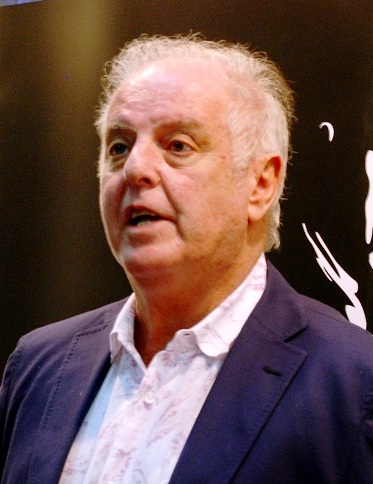Staatskapelle Berlin – Daniel Barenboim with Dorothea Röschmann
By Bruno Tredicine on 4/03/14 • Categorized as Classical music
Staatskapelle Berlin – Daniel Barenboim Conductor, Dorothea Röschmann Soprano
Elliott Carter – Instances (German Première)
Richard Strauss – Four Last Songs
Igor Stravinsky – Le Sacre du printemps
Review by Bruno Tredicine, 18/3/2014
BERLIN/GERMANY: Strauss’ Vier Letze Lieder and Stravinskij’s Sacre du printemps are among the most important achievements in the music of 1900s. To find them both in a program, makes a small event out of a concert. This was the occasion to be found last week in Berlin, where Daniel Barenboim conducted “his” Staatskapelle Berlin, the orchestra of the capital’s Staatsoper Unter den Linden, where the argentinian former pianist is ‘Generalmusikdirektor’.
Actually, the concert was part of the Staatsoper’s season, although it was held in Philharmonie’s Saal, the most imposant music structure of the capital (and it was repeated the following day in the beautiful Konzerthaus am Gendarmenmarkt).
Apart the two famous composition, the evening was opened by a contemporary ‘Stück’, Elliott Carter’s ‘Instances’. Elliott Carter was an American composer, dead in 2012 at the age of 103, and it’s noteworthy that he was active in composing and taking part in musical life almost until his last day
.
It’s impressive what Barenboim has remarked speaking of such an elderly age: when Strauss’ Lider were performed for the first time, Elliot Carter was already 41, and he was already born when Sacre du printemps schocked the audience for the first time in 1913.
Daniel Barenboim himself is very related to this musician, dedicating him a whole concert when he reached 100, and conducting often his works in his programs
. Anyway, Carter’s music is contemporary, with all that this sentence means: not single hint of a melodic line, and somewhat hard to be accepted from the average public. That’s why the first ten minutes of the evening were dedicated by the conductor to illustrate ‘Instances’ making the orchestra play some musical phrases from the most significant of it, and trying to make it a bit ‘familiar’ to the people who filled the Philharmonie.
‘Instances’ is a short work, made of musical sketches creating different athmospheres changing one into the other, like waves arriving and going away giving place to the new one. An impression that Barenboim represents very well holding firmly the orchestra’s pace into the changing dynamics and musical effects. At the end, the audience applaudes with convinction, not only because they have liked, but also for supporting Barenboim’s passion in this music
.
Then, Strauss’ Lieder cycle, with german soprano Dorothea Röschmann as guest. The Four Las Song were written in the very last year of the composer’s life, being performed for the first time after his death. Lyrics are from three poems by Hermann Hesse and one (‘Im Abendrot’) from german poet Joseph von Eichendorff. Already the titles are explicative of Strauss’ attitude: ‘Spring’, ‘September’, ‘Going to sleep’, ‘In the sunset’. What dominates is the perception that something is going to finish, but there’s no tragedy, the mood is that of a sweet melancholy with a serene acceptance of what is about to come, of destiny. The music is highly suggestive and involving, perfectly mixed with the evocative lyrics.
With her warm, homogeneous soprano, Dorothea Röschmann has the perfect timbre for letting the audience penetrate in the right atmosphere: apart the highest notes where her voice loses in softness and in harmonics, her performance is of high level for musicality, technique (the musical texture is not easy, and Röschmann goes all through the pentagram with admirable fluidity), and depth in phrasing and accents. Unfortunately, Barenboim accompany her with great correctness but nothing more: with orchestral times that sometimes seem too fast, he ensures a brilliant sound with the right dynamics, but not a hint of the crepuscularity that dominates the four Lieder; the many precious impressive (almost sometimes impressionistic) music details that fill the score are rightly played by an impeccable and faultless Staatskapelle, but none of them touches our intimate chords for creating empaty with the immense depth hiding in the small sketches written by Richard Strauss.
Igor Stravinskij’s Sacre du printemps is the greatest page of the concert in terms of majestic in orchestration, spectacularity, impact on the music world of last century. There’s no need to remember the scandal that took place in Paris at the prèmiere (as a ballet) in 1913, even if today it’s questionable if it was due to the modernity of the music, or to other factors, considering that a few months later, it was played in other concert halls and nothing happened.
Sacre is an highly demanding work for the orchestra, whose ensemble is huge, and for the conductor to be able to dominate it. Staatskapelle Berlin plays it very well, with a precise sound, as proof of an effective teamwork and conscientious preparation. All the orchestral section have been very accurate: homogeneous the strings, very well controlled the horns as well as the effective percussions and so on. But also in this case we hear a powerful music played with strong dynamics, that stays in some sense ‘cold’: there’s too few of its primitive puzzling strength and of its dramatic, sometimes hypnotic capacity to capture the audience (let’s not forget that the work was born as scene music for a ballet). In the whole a technically good performance which stayed too much in the surface
.
Nevertheless, at the end, long warm applause have greeted the ensemble and above all its conductor.

